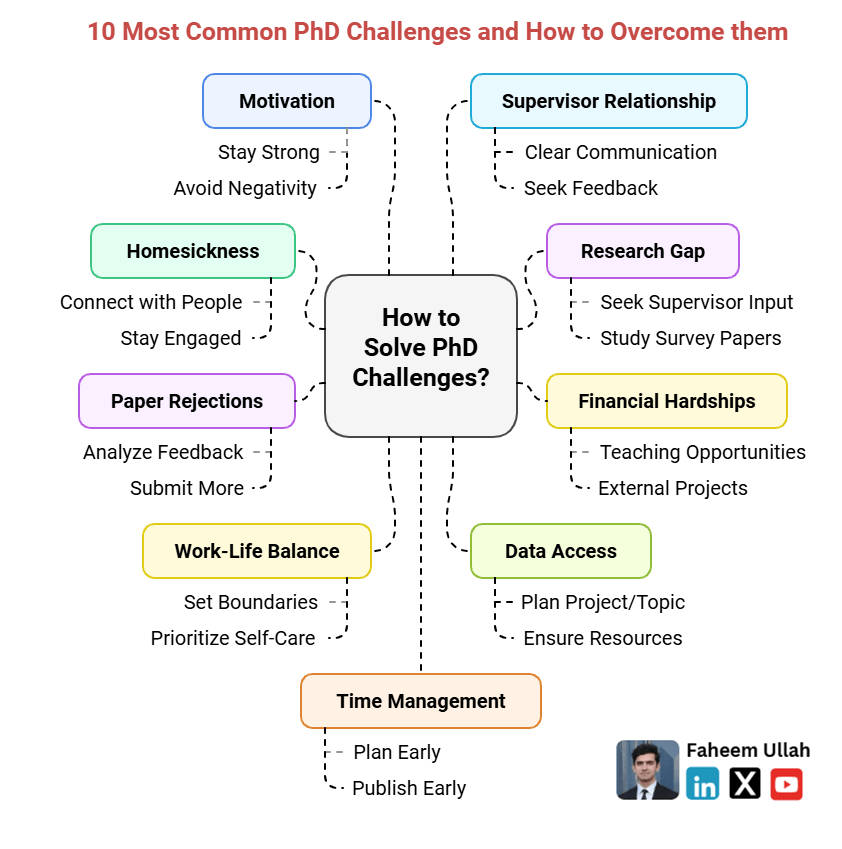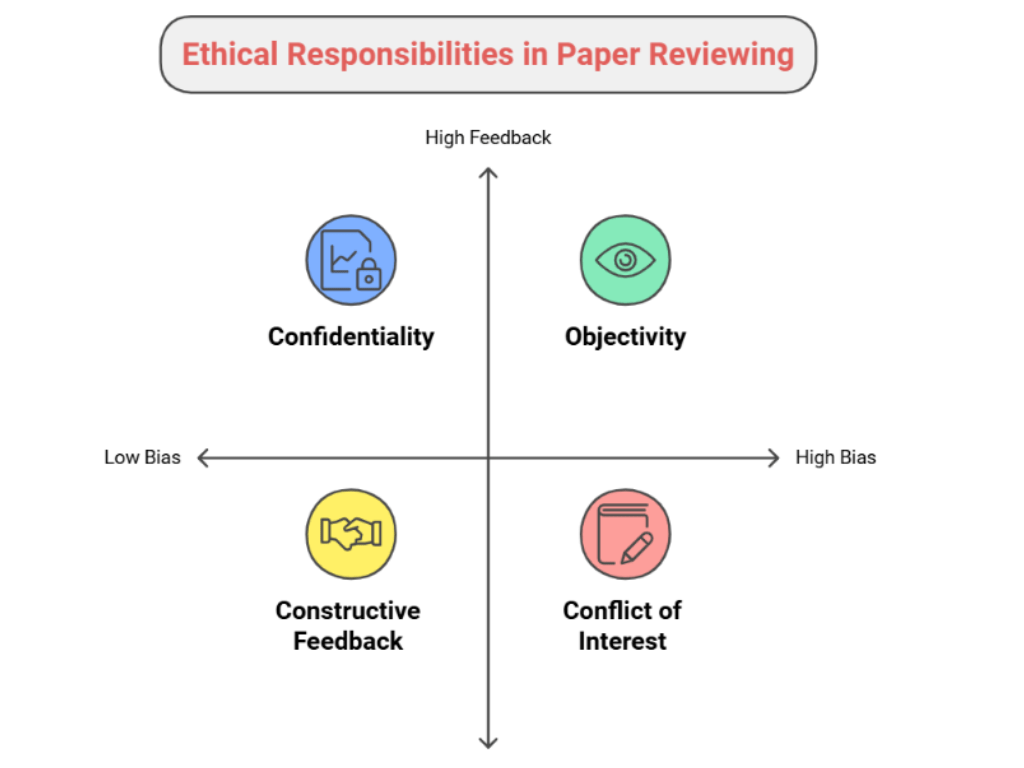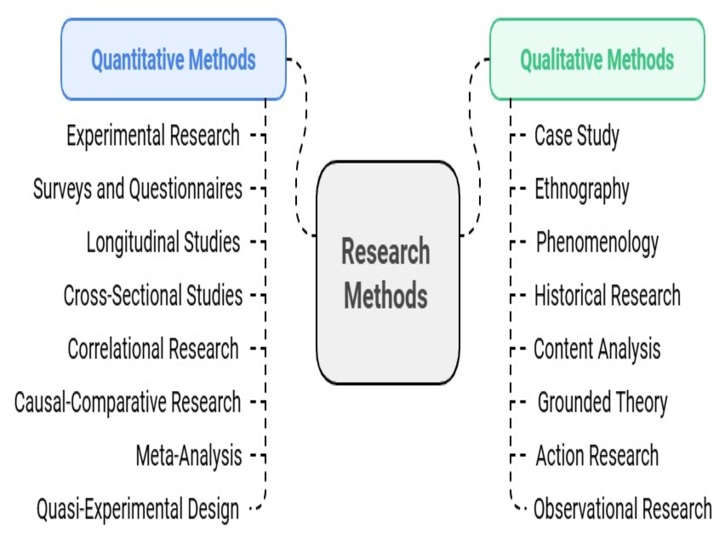

Struggling with Your PhD? You’re Not Alone.
The PhD journey is a marathon, not a sprint. Along the way, you’ll encounter obstacles that test your resilience, focus, and determination. But the good news is that these challenges are shared by many, and they are surmountable. By understanding these hurdles and applying the right strategies, you can navigate your PhD journey with greater confidence.
Here are 10 common challenges faced by PhD students and actionable tips to overcome them.

1. Feeling Homesick
Leaving home for a PhD often means moving to a new city or country, far from family and friends. The initial transition can be daunting and lonely, especially when you’re adapting to a new environment and culture.
Solution: Connect with people before you arrive, such as seniors, classmates, or labmates. These connections will help you settle in faster and make the transition smoother.
2. Struggling to Find a Research Gap
One of the first and most critical steps in your PhD is identifying a research gap. Many students feel overwhelmed by the sheer volume of existing research and struggle to pinpoint where their work fits.
Solution: Don’t aim for a “perfect” gap. Discuss your ideas with your supervisor, use recent survey papers to refine your topic, and start small. You’ll gradually narrow down and clarify your focus as you progress.
3. Financial Hardships
PhD scholarships, while helpful, are often not enough to cover all expenses. Partial funding or unexpected costs can create financial stress, making it harder to focus on your research.
Solution: Look for teaching assistant roles, grading jobs, or opportunities to work on external projects with your supervisor. These side roles can provide financial support and enhance your academic profile.
Do you want to receive feedback on each chapter of your thesis?
Receiving feedback and then incorporating the feedback significantly improves your thesis before submission.
For this, try Review-it.
➟ This tool will identify the strengths and weaknesses in your chapter.
➟ You can then address the weaknesses to improve your overall thesis.
➟ This tool will also score your chapter from 1-10 based on its quality.
| Check it out here: www.review-it.me |
4. Facing Paper Rejections
Paper rejections are part of every researcher’s journey. Receiving critical feedback or outright rejection can feel disheartening, but it’s also an opportunity to improve.
Solution: Carefully analyze reviewers’ comments, revise your paper, and resubmit. Don’t aim for perfection, submit more papers and learn from the process. Remember, persistence pays off.
5. Balancing Work and Life
PhD students often struggle to maintain a healthy balance between work and personal life. Long hours in the lab, tight deadlines, and academic pressure can lead to burnout if left unchecked.
Solution: Prioritize self-care alongside your research. Set boundaries, take regular breaks, and make time for hobbies or social activities. A balanced life will make you more productive in the long run.
6. Lack of Rich Data
A strong research project depends on good-quality data. Unfortunately, not all students have access to the data they need, which can lead to frustration or even a change in topic mid-PhD.
Solution: Before committing to a topic, ensure you have a clear plan for data collection and the necessary resources. Speak with your supervisor early to identify potential gaps and address them proactively.
7. Loss of Motivation
Motivation can wane due to setbacks like paper rejections, failed experiments, or slow progress. When things don’t go as planned, it’s easy to feel stuck or defeated.
Solution: Remind yourself of your long-term goals and the reasons you started this journey. Surround yourself with positive, supportive people, and break tasks into smaller, manageable steps to rebuild momentum.
8. Navigating Supervisor-Supervisee Relationships
Your supervisor is your guide and mentor, but managing this relationship effectively can be tricky. Miscommunications or mismatched expectations can lead to frustration on both sides.
Solution: Keep your relationship professional and respectful. Communicate clearly, seek regular feedback, and set clear goals together to ensure you’re aligned.
9. Running Out of Time
PhD programs are often time-bound, and running out of time or funding can create enormous stress. Finishing your research and writing your thesis within the given timeframe requires careful planning.
Solution: Start planning early and prioritize publishing. Allocate at least four months for thesis writing and stick to your timeline to avoid last-minute panic.
10. Facing a Steep Learning Curve
The start of a PhD often involves mastering new skills, from reading academic papers to conducting analyses and writing. It’s normal to feel overwhelmed when venturing into unfamiliar territory.
Solution: Be patient with yourself and focus on consistent practice. Seek guidance from peers or mentors and don’t hesitate to put in extra effort to bridge gaps in your knowledge.
Final Thoughts
Challenges are a natural part of the PhD journey, but each one is an opportunity to grow stronger and more capable. With preparation, persistence, and support, you can overcome these hurdles and make your PhD a truly rewarding experience.
Which of these challenges resonates most with you? Reply to this email, I’d love to hear your thoughts.
Final Thoughts
Your PhD thesis reflects your expertise and dedication. By following this guide, you’ll structure your thesis in a way that’s clear, compelling, and impactful.
Please share your thoughts related to this article in the comments.

Find me on X , Youtube and LinkedIn
Things you don’t want to miss!
1. Missed my new video, “How to write a research proposal?” Don’t worry—you can watch the full session on my YouTube channel! Click here to dive into practical tips that will help you work smarter, stay focused, and make progress like never before.



